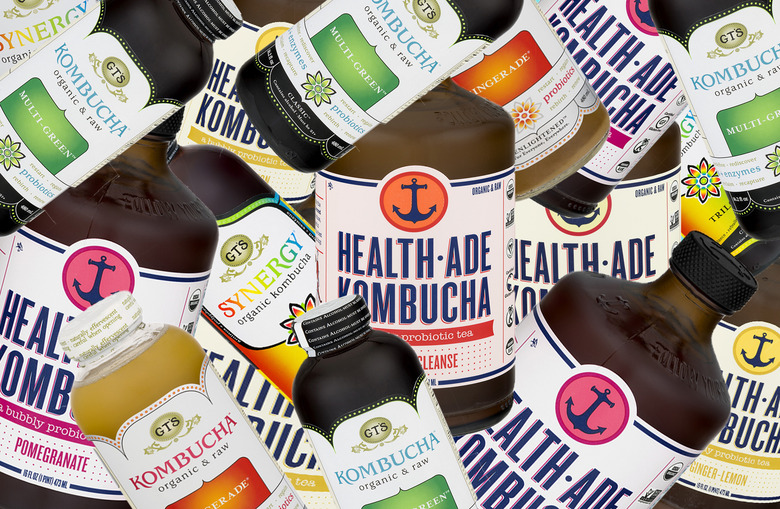How Much Kombucha Is Too Much?
While kombucha is a perfectly healthy drink to sip regularly, there is a point at which you should stop.
Kombucha is a drink made from fermented black or green tea, often hailed for rumored health benefits such as clearer skin, better digestion, stronger immunity, and even cancer prevention. The drink has skyrocketed in popularity lately; at certain grocery stores, there are entire aisles dedicated to the stuff. Some brands even sell kombucha in gallon-sized jugs! But is it possible to drink too much of this sparkling probiotic drink?
To understand the consequences of overloading on kombucha, it's important to understand what's in it. Its main ingredients are tea, sugar, and yeast. The bacteria ferment in a process similar to the production of yogurt, kimchi, or other fermented foods, and create an acidic beverage containing a small amount of alcohol.
The beverage contains caffeine from the tea, sugar to sweeten, and probiotics from the fermentation process. So the risks of drinking too much are intricately linked to the risks of taking in too much sugar, too much caffeine, and too many probiotics.
Risks of Too Much Sugar
"According to the World Health Organization (WHO), adults and children should 'reduce their daily intake of free sugars to less than 10 percent of their total energy intake. A further reduction to below 5 percent or roughly 25 grams (6 teaspoons) per day would provide additional health benefits,'" Julieanna Heaver told The Daily Meal. "Yet, we are consuming almost twice as much as that in the United States."
Your typical store-bought kombucha contains anywhere from 4 to 20 grams of added sugar per bottle, depending on the brand. Some brands rely more potently on added sugar than others — so depending on how many kombucha bottles you're drinking every day, you may want to check the sugars on the label.
Risks of Too Much Caffeine
Kombucha also contains caffeine — though not nearly as much as coffee or an energy drink. And while scientists suggest that there might not be a limit to how many cups of coffee you should drink every day, some people experience negative reactions to drinking too much caffeine. You may become jittery, for instance, or experience the effects of higher blood pressure.
You'd have to drink a ton of kombucha to overdo it with the caffeine, though — a cup of kombucha has about a fourth the caffeine content of a cup of coffee.
Risks of Probiotics
For most people, the sky is really the limit when it comes to probiotics and fermented foods. Every person's digestion reacts differently to bacteria, so your best bet is to pay attention to your own body and decide how much is too much for you. But in terms of safety, you're probably in the clear.
The only exception is for people with weakened immune systems. It's very rare, but in certain cases of weakened immune systems, too many probiotics can cause a serious infection.
It's also worth noting that a few organizations, such as the Centers for Disease Control and Prevention and the Memorial Sloan-Kettering Cancer Center have expressed concern that too much kombucha could cause acidosis — a condition wherein the body's pH becomes overly acidic and dangerous. A couple of unexplained deaths due to acidosis were linked to kombucha, but it's unclear whether kombucha was the real cause.
People everywhere drink kombucha every single day — without complication. Your best bet? Don't overconsume any food or beverage to the point of discomfort. Even vegetables!
